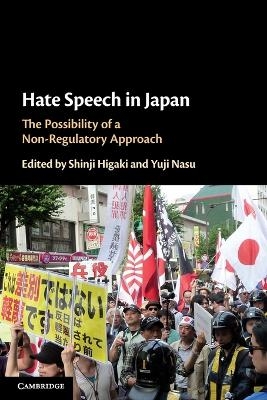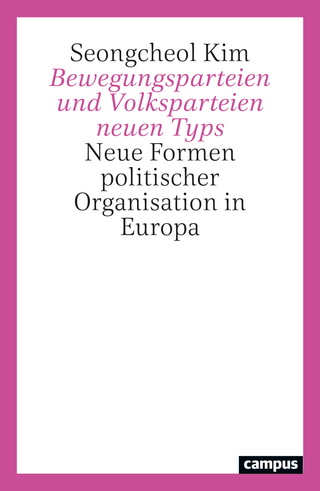
Hate Speech in Japan
Cambridge University Press (Verlag)
978-1-009-25652-0 (ISBN)
This book explains the past and present status of hate speech regulations in Japan. The United States and European countries have adopted different approaches to resolve their respective hate speech problems. Both of them, however, continue to confront the dilemma that freedom of speech and anti-racism are fundamental values of human rights. Therefore, some scholars criticize the US approach as too protective of freedom of speech, while other scholars criticize the European approach as impermissibly violating that freedom. Compared to these countries, Japan is unique in that it does not criminalize hate speech and hate crime other than in the recently enacted Kawasaki City Ordinance criminalizing some kinds of hate speech. Japan basically relies on a comprehensive set of non-regulative tools to suppress extreme hate speech. This volume analyses Japanese hate speech laws and suggests a unique distinctive model to strike a balance between both core values of democracy.
Shinji Higaki is Associate Professor of Law at Fukuoka University, Japan. He has been a visiting scholar at the U.S.–Asia Law Institute of New York University School of Law and the Peter A. Allard School of Law of the University of British Columbia. He earned his Ph.D. in Law from Doshisha University in 2015. He specializes in constitutional law, particularly freedom of speech. He is the author of numerous works on free speech issues, including Heito Supīchi Kisei No Kenpōgakuteki Kōsatsu [A constitutional analysis on hate speech regulation] (Hōritsu Bunkasha, 2017). Yuji Nasu is Professor of Law at Seinan Gakuin University, Japan, where he teaches constitutional and comparative law. His research interests are primarily in the freedom of expression, with particular focus on hate speech and definitional balancing. He has written numerous articles on free speech, and these have been published in Japanese periodicals such as Hōgaku Seminā [Legal Studies Seminar] or Amerika Hō [American Law]. He is an expert on hate speech law. He recently published Heito Supīchihō no Hikaku Kenkyū [Comparative Study of Hate Speech Laws] (Shinzansha, 2019), analyzing the laws of the US, the UK, Canada, and Japan.
Introduction; Part I. Outline: 1. Hate speech regulation and anti-discrimination in Japan Atsushi Kondo; 2. Freedom of expression in Japan: constitutional framework of protection Shigenori Matsui; 3. Hate Speech and International Law: The Internalisation of International Human Rights in Japan Ayako Hatano; Part II. History: 4. Buraku discrimination and hate speech: complex situations of classical and contemporary discrimination in Japan Takanori Yamamoto; 5. Current movement of hate speech: focusing on hate speech directing to Korean residents in Japan Ryangok Ku; 6. Failure of the human rights vindication bill Masayoshi Kaneko; Part III. Legal Framework: 7. Hate speech and criminal law frameworks in Japan Osamu Sakuraba; 8. Tort liability for hate speech in Japan Kensuke Kajiwara; 9. Frameworks of the local ordinances: efforts and challenges of local governments in Japan against hate speech Hideki Nakamura; 10. The legislative process of the Hate Speech Elimination Act Katsuo Yakura; 11. Hate Speech Elimination Act: a legal analysis Shinji Higaki; Part IV. Cases: 12. Kyoto Korean Elementary School Case: The Facts Il-song Nakamura, translated by Mana Sato; 13. Kyoto Korean Elementary School Case: A Legal Analysis Shiki Tomimasu; 14. An Injunction Banning a Xenophobic Group from Demonstrating: Kawasaki Case Toru Mori; Part V. Multidisciplinary Debates Relating to Hate Speech Regulation: Possibilities for Further Regulation: 15. The free speech jurisprudence in Japan: the influence of comparative constitutional law Keigo Obayashi; 16. Japan's postcolonial hate speech Naoto Higuchi; 17. Quantitative and theoretical investigation of racism in Japan: a social psychological approach Fumiaki Taka; Part VI. Current Issues: 18. Hate speech on the internet Kazushi Ogura; 19. Hate groups and the use of public facilities: striking a balance between the right to assembly and interests of minority residents Yuji Nasu; 20. Hate speech in the mass media: a dispute over broadcasting in Japan Shinji Uozumi.
| Erscheinungsdatum | 10.08.2022 |
|---|---|
| Zusatzinfo | Worked examples or Exercises |
| Verlagsort | Cambridge |
| Sprache | englisch |
| Maße | 152 x 229 mm |
| Gewicht | 697 g |
| Themenwelt | Recht / Steuern ► Allgemeines / Lexika |
| Recht / Steuern ► EU / Internationales Recht | |
| Sozialwissenschaften ► Politik / Verwaltung ► Vergleichende Politikwissenschaften | |
| Sozialwissenschaften ► Soziologie | |
| ISBN-10 | 1-009-25652-1 / 1009256521 |
| ISBN-13 | 978-1-009-25652-0 / 9781009256520 |
| Zustand | Neuware |
| Informationen gemäß Produktsicherheitsverordnung (GPSR) | |
| Haben Sie eine Frage zum Produkt? |
aus dem Bereich


